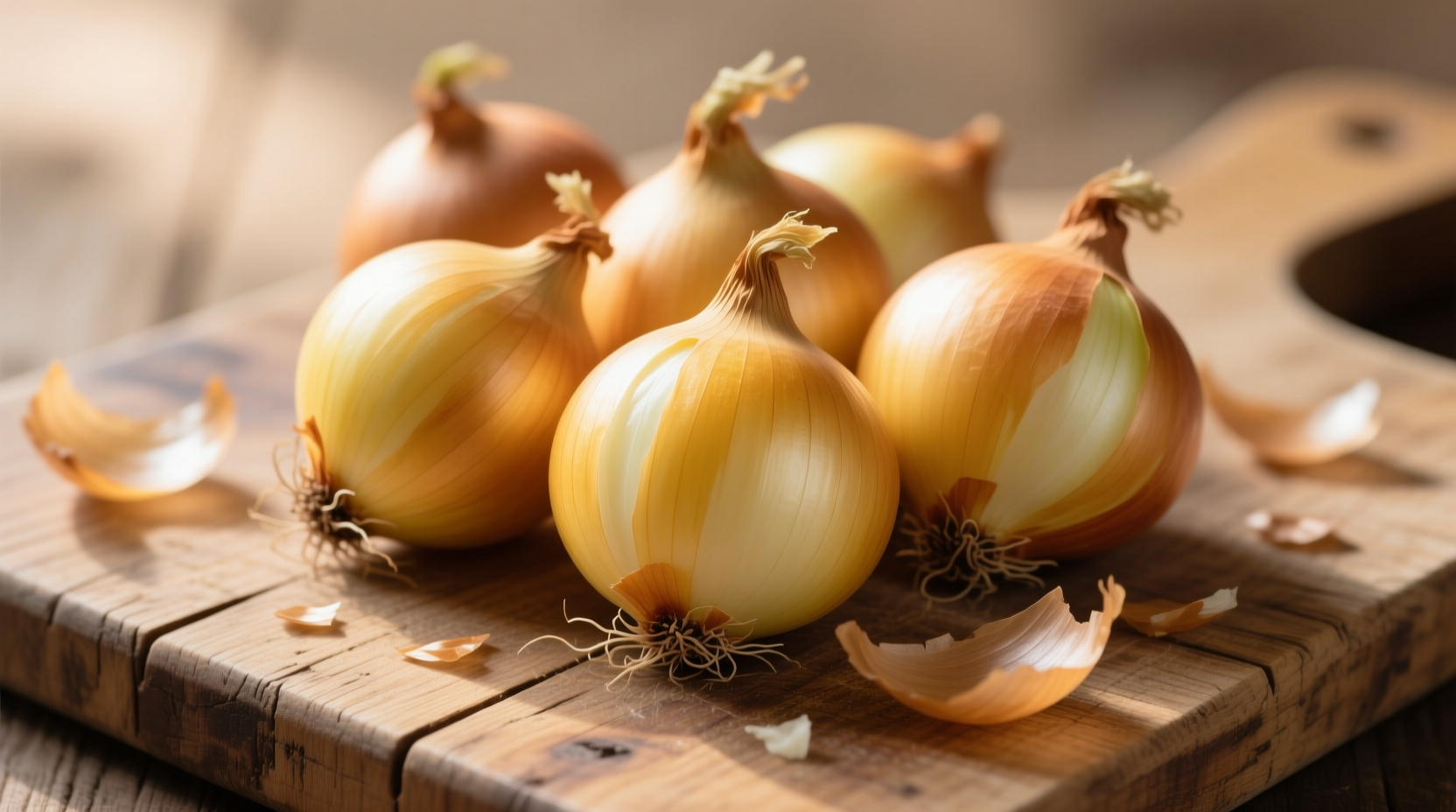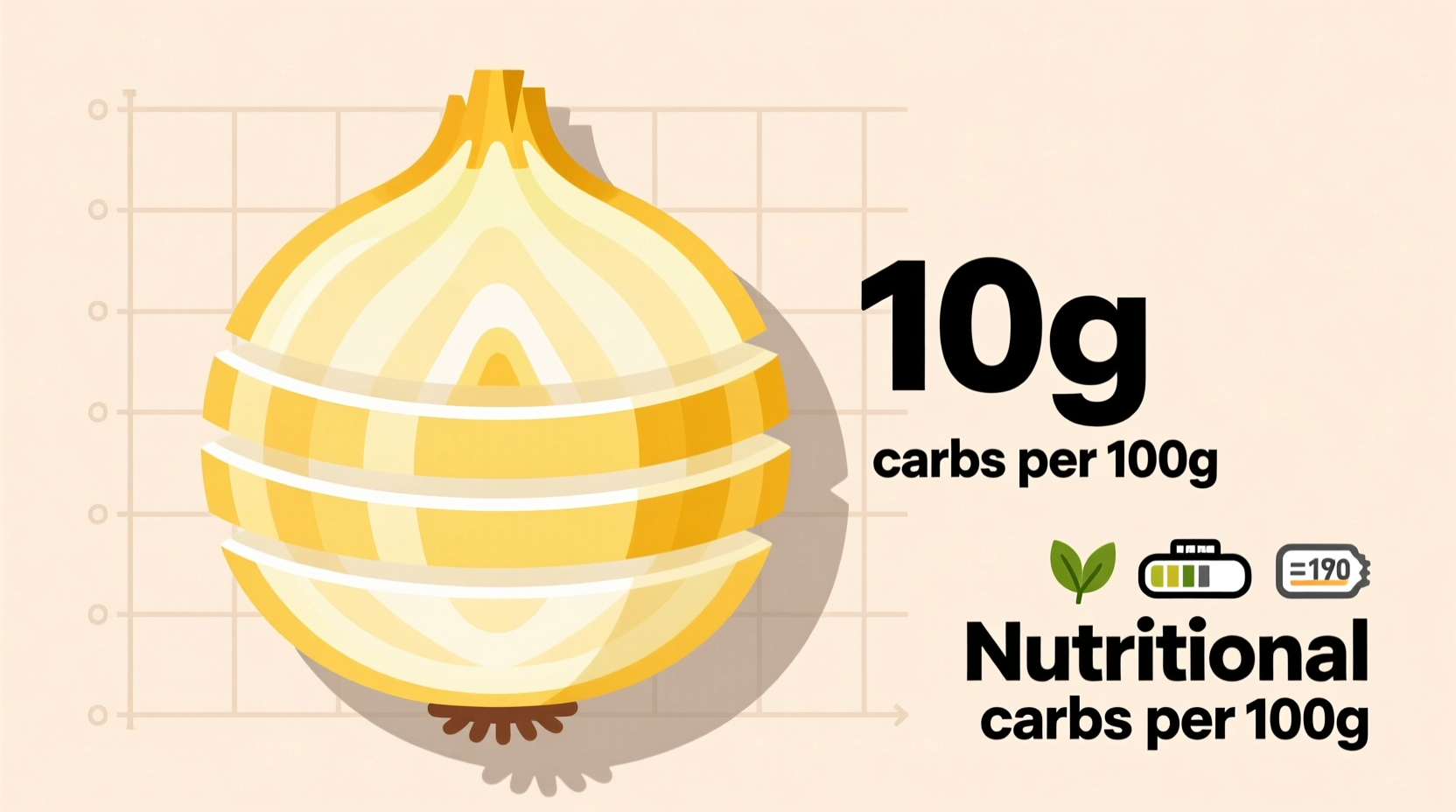One medium yellow onion (110g) contains approximately 9.4 grams of total carbohydrates, with 1.9 grams of dietary fiber and 5.1 grams of natural sugars. Raw red onions have slightly fewer carbs at 8.9g per medium onion, while scallions contain just 2.3g per 100g serving.
Understanding the carbohydrate content in onions is essential for anyone tracking their nutritional intake, whether you're following a keto diet, managing diabetes, or simply aiming for balanced eating. As a chef who's worked with ingredients at both molecular and culinary levels, I've seen how precise nutritional knowledge transforms cooking outcomes and dietary success.
Why Onion Carb Counts Matter for Your Diet
Onions might seem like a simple kitchen staple, but their carbohydrate composition significantly impacts how you should incorporate them into specific eating plans. Unlike many vegetables that are predominantly water with minimal carbs, onions contain notable amounts of natural sugars that contribute to their distinctive flavor profile.
When I worked in restaurant kitchens, we carefully calculated onion quantities not just for flavor balance but for nutritional accuracy in our health-conscious menu items. The carbohydrates in onions primarily consist of:
- Simple sugars (fructose, glucose, sucrose) - responsible for sweetness
- Dietary fiber - beneficial for digestion
- Complex carbohydrates - minimal amounts
These components affect blood sugar differently, making it crucial to understand the full carb picture rather than just total carbohydrate numbers.
Carbohydrate Breakdown by Onion Variety
Not all onions are created equal when it comes to carbohydrate content. The variety, size, and preparation method all influence the final carb count. Here's how different onions compare based on USDA FoodData Central measurements:
| Onion Type | Per 100g | Per Medium Onion | Fiber Content |
|---|---|---|---|
| Yellow Onion (raw) | 9.34g | 9.4g | 1.7g |
| Red Onion (raw) | 8.90g | 8.9g | 1.8g |
| White Onion (raw) | 9.10g | 9.1g | 1.6g |
| Scallions (raw) | 2.30g | 1.2g | 1.4g |
| Caramelized Onion | 15.20g | 15.2g | 2.0g |
This comparison reveals why scallions are often recommended for strict low-carb diets—they contain significantly fewer carbohydrates than bulb onions. The caramelization process concentrates sugars, nearly doubling the carb density compared to raw onions.

How Cooking Methods Affect Carb Content
Many people don't realize that preparation methods dramatically alter onion carbohydrate density. When I teach cooking classes, I emphasize this critical point because it affects dietary calculations:
- Raw onions maintain their natural water content, resulting in lower carb density per volume
- Cooked onions lose water through evaporation, concentrating the remaining carbohydrates
- Caramelized onions undergo the Maillard reaction, converting some complex carbs to simple sugars
- Dehydrated onions have the highest carb density as nearly all water is removed
For example, 1 cup of raw chopped yellow onion (160g) contains about 15g total carbs, while the same volume of caramelized onions (which reduces to approximately 50g after cooking) contains around 7.6g carbs. However, because caramelization concentrates flavors, people often use larger quantities, inadvertently increasing carb intake.
Practical Carb Counting for Common Dishes
Understanding how onions contribute to your daily carb intake requires context. Here's how onions factor into everyday meals based on standard recipes:
- French Onion Soup (1 serving): Approximately 15-20g carbs from onions alone
- Stir-fry (1 serving): 3-5g carbs depending on onion quantity
- Salsa (1/2 cup): 2-3g carbs from diced onions
- Onion Rings (3 oz serving): 25-30g carbs (mostly from batter)
When developing recipes for clients with specific dietary needs, I always calculate onion contributions separately from other ingredients. This precision makes the difference between staying within carb limits and accidentally exceeding them.
Scientific Context: How Researchers Measure Onion Carbohydrates
Nutritional databases like the USDA FoodData Central use precise laboratory methods to determine carbohydrate content. The standard procedure involves:
- Freeze-drying onion samples to remove all moisture
- Using enzymatic hydrolysis to break down complex carbohydrates
- Measuring individual sugar components through high-performance liquid chromatography
- Calculating total carbohydrates by difference (subtracting moisture, protein, fat, and ash from total weight)
This rigorous methodology ensures the accuracy of the nutritional information you rely on for dietary planning. The USDA has maintained this standardized testing protocol since 1995, with regular updates to measurement techniques as technology improves.
Onions in Specialized Diets: Practical Guidance
Whether you're following a specific eating plan or managing health conditions, understanding onion carb content helps you make informed choices:
Keto Diet Considerations
For strict keto dieters limiting carbs to 20-50g daily, onions require careful portion control. A single medium onion could represent 20-45% of your daily carb allowance. Consider these alternatives:
- Use scallions instead of bulb onions (1/4 the carb content)
- Limited to 1-2 tablespoons of finely diced onion per serving
- Substitute with asafoetida (hing) for onion-like flavor with negligible carbs
Diabetes Management
The glycemic index of raw onions is approximately 10, making them a low-impact choice for blood sugar management. However, caramelized onions have a higher glycemic index around 32 due to sugar concentration. Pair onions with protein and healthy fats to further minimize blood sugar impact.
General Healthy Eating
For most people, the carbohydrate content in onions presents no concern. The fiber content actually enhances their nutritional profile, supporting gut health and providing sustained energy release. The American Heart Association recommends including onions as part of a balanced diet for their cardiovascular benefits.
Common Misconceptions About Onion Carbs
Through my years in professional kitchens and nutrition education, I've encountered several persistent myths:
- Myth: All onions have the same carb content
Fact: Red onions contain slightly fewer carbs than yellow varieties - Myth: Cooking eliminates carbohydrates
Fact: Cooking concentrates carbs by removing water - Myth: Onion carbs are "bad" carbs
Fact: Onion carbohydrates include beneficial fiber and natural sugars without added refined sugars
These misconceptions often lead to unnecessary dietary restrictions or inaccurate carb counting. Understanding the science behind onion composition helps you make informed decisions without fear.
Tracking Your Onion Consumption
For precise carb counting, follow these practical steps:
- Weigh onions before and after preparation to account for water loss
- Use kitchen scales rather than volume measurements for accuracy
- Reference reliable nutritional databases like USDA FoodData Central
- Consider the entire dish when calculating carb contributions
- Track your personal tolerance to onion carbohydrates in your diet
When I work with clients on dietary planning, I recommend keeping a food journal that specifically notes onion varieties and preparation methods, as these details significantly impact the nutritional math.











 浙公网安备
33010002000092号
浙公网安备
33010002000092号 浙B2-20120091-4
浙B2-20120091-4